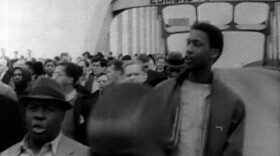This weekend, the city of Selma will mark the fiftieth anniversary of the civil rights event known as “bloody Sunday.” In 1965, sheriff deputies and state troopers attacked African American protesters during a voting rights march from Selma to Montgomery. The violence is etched into world history, but it’s not the first time this city has seen bloodshed nor was 1965 the city's first "march to freedom."
The fiftieth anniversary of the attack on voting rights marchers in Alabama in 1965 will include a visit by President Obama. But, once these crowds go home, another event is planned…
Next month is the one hundred and fiftieth anniversary of the battle of Selma during the civil war. Union troops under general James Wilson faced Confederate General Nathan Bedford Forrest in 1865. It’s where events in 1965 and 1865 intersect that has the attention of historians…
“Well, the first thing is that I got goosebumps all over my body…”
Linda Derry is one of those historians. She met us at the Cahawba archeological site not far from where the battle of Selma took place. Derry is the director. The reason for her excitement takes a little explaining… Derry and I tramp through the forest to an archeological dig where the Alabama and Cahaba rivers meet. She says after Union General Wilson beat Confederate general Forrest, they met at the house that once stood here…
“And what did they do, they get together and they have dinner. And after dinner, they went into parlor and I imagine they had cigars and cordials, I don’t know, and I betcha that what they did, and had a nice sit down conversation and they sized each other up…”
It’s an entry in General Wilson’s memoirs about what happened next that Derry says gave her goose bumps.
“…but a great number of fugitives from the surrounding country flocked into the town and our march to the Eastward had hardly begun when it became apparent that new crowds were following us, which made vigorous measures necessary for getting rid of them."
And by fugitives, historians say Wilson meant freed black slaves…
"...the rear guard tried to keep them away," recalled General Wilson. "But, nothing could stop them from taking the path to freedom."
“And then looking at where they were marching," says Derry. "They were marching from Selma to Bentonville to Lowdnesboro to Montgomery and those are exactly, the exactly the same route, that the civil rights marchers took.”
“Now, during the Selma expedition, thousands of slaves did, in fact, fall in with Wilson and were led out of slavery," says Edward Longacre. He's a retired historian with the U.S. Department of Defense. He’s written over twenty books on the Civil War. His first was a biography of General Wilson.
“Anytime Union armies invaded the south and were in such numbers to offer protection and security," says Longacre. "Hundreds if not thousands of slaves fled local plantations and joined the army in the hope of being led out of bondage…”
And then there were the battles where things didn’t turn out so well. One year before the battle of Selma, General Wilson’s cavalry fought in the battle of Staunton River Bridge in Virgnia. Longacre says slaves flocked to Wilson’s troops for help, but that time the Union side was losing the fight…
“Wilson’s men had, basically, to flee every man on his own," recalls Longacre. "And they left behind hundreds of slaves who had fallen in with the columns, and they were quickly captured and returned to their masters.”
Despite the local popularity of the battle of Selma, Wilson’s trek to Montgomery along the same route as the 1965 voting rights marchers might have been lost to history. It was mentioned in a couple of paragraphs in his memoirs written in 1912. Longacre has a simple answer on why both Wilson was almost forgotten along with the battle of Selma…
“It lacks strategic importance. It didn’t really contribute anything to the Union causes because the South was already on the ropes, and its armies were surrounding. For that reason, his main accomplishment to the war was overlooked.”
Despite that fact, Civil War re-enactors will gather in Selma next month to remember the battle of Selma on it’s one hundred and fiftieth anniversary—one hundred years before “Bloody Sunday” on the Edmund Pettus Bridge..












